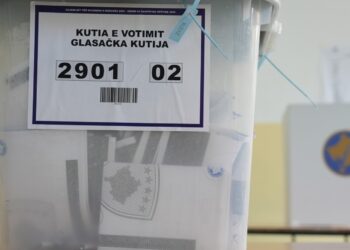By Boldnews.al
A message received from the Boldnews.al editorial board, further strengthened by internal sources from the School of Magistrates, reveals that at least two of the qualified candidates for a member of the Constitutional Court do not meet the minimum professional criteria for they were magistrates.
Arta Vorpsi and Elsa Toska are currently legal advisers to the Constitutional Court. The two lawyers have been qualified by the Council of Justice Appointments (KED) to continue the race for judge at the institution where they are currently practicing.
But both Vorpsi and Toska have not achieved the minimum score on the professional test, held last year at the School of Magistrates.
The Law on “Transitional Reassessment of Judges and Prosecutors” (Veting), as well as the Law “On the Status of Judges and Prosecutors”, both of which are part of the Justice Reform, provide legal assistants to the Constitutional Court with the Supreme Court. and to the Prosecutor General’s Office to obtain the status of magistrate after having passed, inter alia, the professional test organized by the School of Magistrates.
In May 2018, legal assistants from top justice institutions were included in the test organized by the Magistrate.
The results of the test, unlike the practice of the School of Magistrates, have not been made public.
However, sources from that institution confirmed to Boldnews.al that qualified candidates for a post in the Constitutional Court, Arta Vorpsi and Elsa Toska, had crashed the School of Magistrates test.
The professional aspect is one of the three essential criteria of the Wetting process, together with that of wealth and personal integrity.
The Independent Qualification Commission (KPK), in two different decisions, has decided on the incumbent confirmation of subjects Arta Vorpsi and Elsa Toska, namely with decisions no. 12.11.2018 and no. 105, dt. 02/12/2019.
The KPK has found that Vorpsi and Toska successfully pass all three criteria, including the professional one.
But, as revealed by the whitewashing decisions of the Vetting Commission, for the evaluation of professional criteria, KPK judicial bodies have referred to reports forwarded by the former High Council of Justice.
In both cases, the KPK does not appear to have requested information or been notified by the School of Magistrates on the test results, conducted in May 2018, ie 8–10 months before the Vet Committee completed the reassessment process.
On the other hand, the Justice Appointments Council, the body responsible for selecting the most prominent lawyers for members of the Constitutional Court, does not appear to have referred to the results of the testing conducted by the School of Magistrates.
By decision no. 54, dated 24.07.2019, the KED approved the report of the Relative Member Arta Marku (Interim General Prosecutor), allowing the candidacy of the lawyer Arta Vorpsi for the race for member of the Constitutional Court.
Based on this decision, it turns out that the rapporteur Arta Marku has made a verification on the formal criteria, without deepening the candidate’s professional skills. In this decision, it does not appear that the test conducted by the School of Magistrates has been requested or taken as a reference.
For the other candidate, Elsa Toska, the KED has allowed her nomination to the Constitutional Court, but the whitewashed decision in this case is not published on the official website of the Council of Justice Appointments (special section on the Supreme Court’s official website) .
However, it seems clear that, even in the case of Toska candidate, her failure, according to confidential sources, to take the test of the School of Magistrates was not taken into account.
The inclusion in the race for a member of the Constitutional Court of at least two candidates who fail to qualify as simple magistrates raises questions about the seriousness of the process and the quality of decision-making of the Council of Judicial Appointments.
Also, the selection of candidates who did not pass the Magistrates’ School test seriously affects the quality of the future decision-making of the Constitutional Court.














